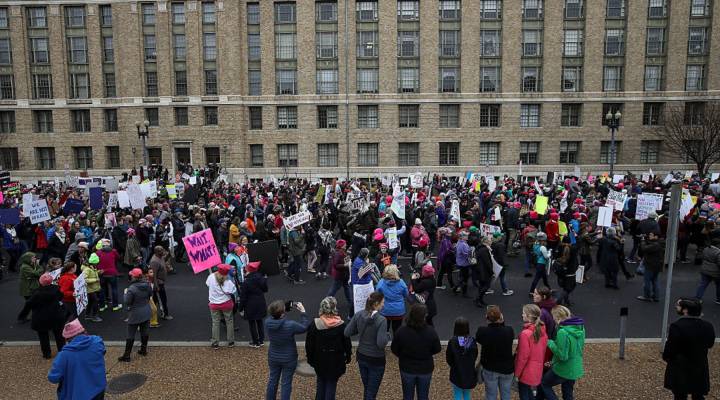
Blog: Founding conflicts, conflicting numbers

In case you missed it in our barrage of tweets, Marketplace’s new podcast, Make Me Smart, is live!
In yesterday’s inaugural (get it?) episode, we engaged in a news-filtering exercise in which we tried to separate group the flurry of actions coming from the Trump administration into those you might expect from a very conservative Republican administration and Congress, and those that fall into what might be described as”non-standard” territory.
We also gathered voices from President Donald Trump’s inauguration and from the women’s march in Los Angeles, and we tried to answer some of your questions on whether Trump tweets might create insider trading conflicts, and on how to tell good numbers from bad.
So, I promised you a name
We also talked about the Bureau of Labor Statistic’s monthly Employment Situation report, which we often short-hand as the “jobs” report. We wanted to better understand the process of polling a group of people. I mentioned an interview about online polling that I did for Marketplace Tech (I think I said Marketplace Weekend, but my mistake) before the election. I couldn’t remember her name when we were recording, but the interview was with Sunshine Hillygus of Duke University. She said the business of polling has gotten dangerously out of hand.
“I think we have to be really careful to distinguish different types of online polls. Conducting a poll online just means it’s a particular method or mode by which we contact people. And there are scientific online polls, and then there are some really really terrible flash polls,” she said. “These are flash polls, opt-in online polls, and these are ones that are really different from the scientific polling that can be conducted online.”
Take a listen to my full interview with Hillygus here, it begins at about 3:17.
I know that none of that answers the question of statistics, and how government agencies come up with the numbers they come up with, and how to tell if those are fishy — we’re working on that topic for a future discussion.
Now, about George…
Ok, on to George Washington because, wow, do you guys know a lot about George Washington. When we promoted Make Me Smart on Marketplace this week, I mentioned that Washington’s wealth came mostly from land speculation. Sean Miller, among others, wrote in with this important point:
While it is true that he obtained much of his working income as a young man as a surveyor (including surveying the land with Jefferson and L’Enfant for the federal District), Washington had a generous family backing to start with, and more importantly, Washington’s income throughout his life was largely based upon his slaves. For instance, he ran the largest distiller in early America — all powered by slavery. He also operated one of the largest cider mills in America, among many other plantation efforts that produced large sums of income over his entire life (he had slaves starting when 11 years old!), so much so that he was able to free his slaves at his death, unlike many of his financially indebted contemporaries like Jefferson.
In another example of the exact kind of awesomeness that comes from asking our listeners for answers, here’s one from Tom Guglielmo. He’s an associate professor of American Studies at George Washington University, and wrote about the topic of owning slaves and the conflict of interest therein:
On today’s Make Me Smart episode, you claimed that GW’s wealth came primarily from land speculation. I have to believe some significant chunk of his wealth — perhaps most of it — came from his ownership of other human beings. Worth looking into, especially given the overall topic of conflicts of interest and, in this case, the protection and proliferation of the peculiar institution. Based on a quick search, it appears that twelve U.S. presidents owned enslaved people, and the wealth they derived from this ownership was enormous.
If you want to learn more about that, Guglielmo suggests research from Robert Lopresti, a librarian at Western Washington University, and this article by Ta-Nehisi Coates, which describes just how much wealth was derived from holding slaves.
And in a comment I got on Twitter, @AndyRose12 pointed out that even Washington’s land speculation likely involved taking land from native populations.
These are the smart follow-ups that make me so excited for the future of Make Me Smart, so thank you. We won’t always have all the answers, or a broad enough historical or cultural perspective on any given issue. But together, we just might get there.
The other side
And speaking of togetherness, in the podcast Kai talked about the voices we heard on this week’s show: our questions from the inauguration and LA women’s march on what people on each side of our current political divide wanted the other side to know.
Without reservation, most people we interviewed basically wanted “the other side” to know that they’re good people, they love America, and they want a dialogue.
So the question then is, what’s keeping us from that dialogue? This is something we’re going to be exploring on the podcast, so look for that to be an ongoing theme.
Make sure to tune in every Monday on Facebook at 10:30 a.m. PST to join our conversation about what should be on the podcast the following Tuesday. It’s really helpful for us to hear what you’re thinking!
There’s a lot happening in the world. Through it all, Marketplace is here for you.
You rely on Marketplace to break down the world’s events and tell you how it affects you in a fact-based, approachable way. We rely on your financial support to keep making that possible.
Your donation today powers the independent journalism that you rely on. For just $5/month, you can help sustain Marketplace so we can keep reporting on the things that matter to you.












